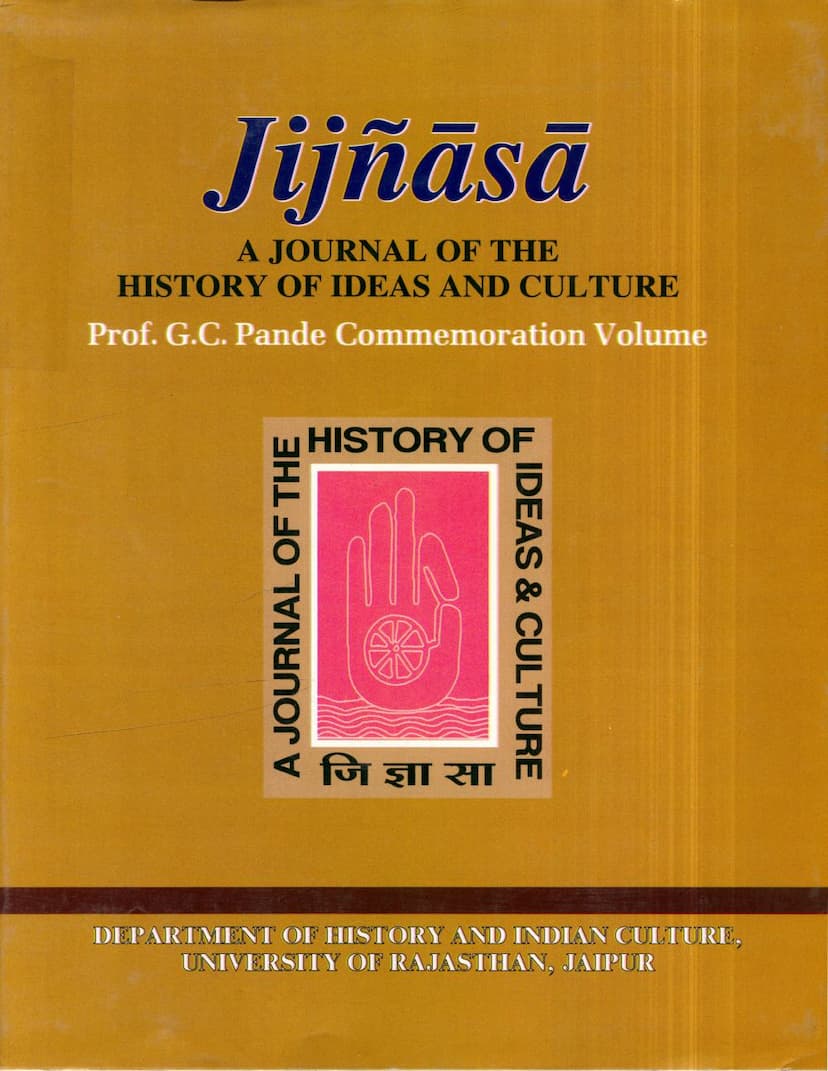Jignasa Journal Of History Of Ideas And Culture Part 02
Added to library: September 2, 2025

Summary
This document is the "Jignasa Journal of History of Ideas and Culture Part 02," a special commemoration volume dedicated to Professor Govind Chandra Pande. It was published by the Department of History and Indian Culture at the University of Rajasthan, Jaipur. The volume contains a collection of scholarly articles covering a wide range of topics related to Indian history, culture, religion, philosophy, art, archaeology, and historiography.
Here's a breakdown of the content and key themes:
Overall Theme and Purpose: The journal serves as a tribute to the significant contributions of Professor G.C. Pande, a distinguished scholar in Indology, religion, culture, and philosophy, and the founder editor of the "Jijñāsā" journal. The publication aims to celebrate his legacy and compile diverse scholarly research in his honor.
Structure of the Volume: The volume is presented in two parts, with articles organized into five sections:
- Papers in Memory of Prof. G.C. Pande: Articles focusing directly on Professor Pande's life, work, and intellectual contributions.
- Religion, Philosophy and Historiography: Essays exploring various aspects of Indian religious thought, philosophical traditions, and the study of history.
- Archaeology, Epigraphy, Numismatics: Research related to ancient Indian material culture, inscriptions, and coinage.
- Art, Architecture, Iconography and Paintings: Articles discussing various forms of Indian art, architectural styles, religious imagery, and painting traditions.
- History and Miscellaneous Articles: A broader section covering historical studies on different periods and regions, as well as miscellaneous topics related to Indian culture.
Key Topics and Themes Covered by the Articles (based on titles):
- Professor G.C. Pande: Tributes and reflections on his scholarship.
- Bhakti Tradition: Studies on figures like Meera Bai, Kabir, and the philosophical aspects of Bhakti.
- Buddhism: Examination of Buddhist meditation, the decline of Buddhism in India, and its art.
- Historiography: Comparative studies of Vedic and Pre-Socratic thought, and the tradition of historical writing in Rajasthan and the Vakataka period.
- Jainism: Akbar's association with Jainism, and the Jain temples of Caita.
- Hindu Philosophy and Religion: Ethical thought of Shri Krishna, Sāńkara's philosophy, and the concept of 'Dohada' (a folk tradition).
- Archaeology and Material Culture: Coins of ancient republics in Rajasthan, Pleistocene environment and cultural succession, ancient inscriptions, urban centers, and archaeological sites like Pakkākot.
- Art and Architecture: Dāna Pāramitā in Buddhist art, Goddess Vikatā of Harshanātha, Sāradā Temple at Maihar, paintings of the Peshwa period, and Jain temples.
- Social History: Dayanand Saraswati's reform movement, Ibn Battuta's observations of 14th-century North India, the study of "Vahivanca ni Vahi" (chronicler's records) for understanding Indian culture, the portrayal of feminine space in early medieval Rajasthan, and the status of women in the Rigvedic period.
- Cultural and Literary History: The collective worlds of John Steinbeck, Anantha Murthy, and Raja Rao; the construction of China by Indians; and the water culture of Marwar.
- Political and Administrative History: Asoka's ideal of Dhamma Vijaya and its impact on diplomacy, and the political system of North India during the early medieval period with a focus on the Gurjara-Pratihara administrative system.
- Technological Development: Technological advancements during the Sultanate period.
- Pothikhana of Jaipur: A study of its special 'Khās-Muhar' collection.
Contributors: The volume features contributions from a wide array of scholars, professors, and researchers from various universities and institutions across India, reflecting a broad spectrum of expertise in different historical and cultural domains.
In essence, the "Jigñāsā Journal of History of Ideas and Culture Part 02" is a rich academic compilation that offers deep insights into various facets of Indian civilization, presented as a fitting tribute to the enduring legacy of Professor G.C. Pande.